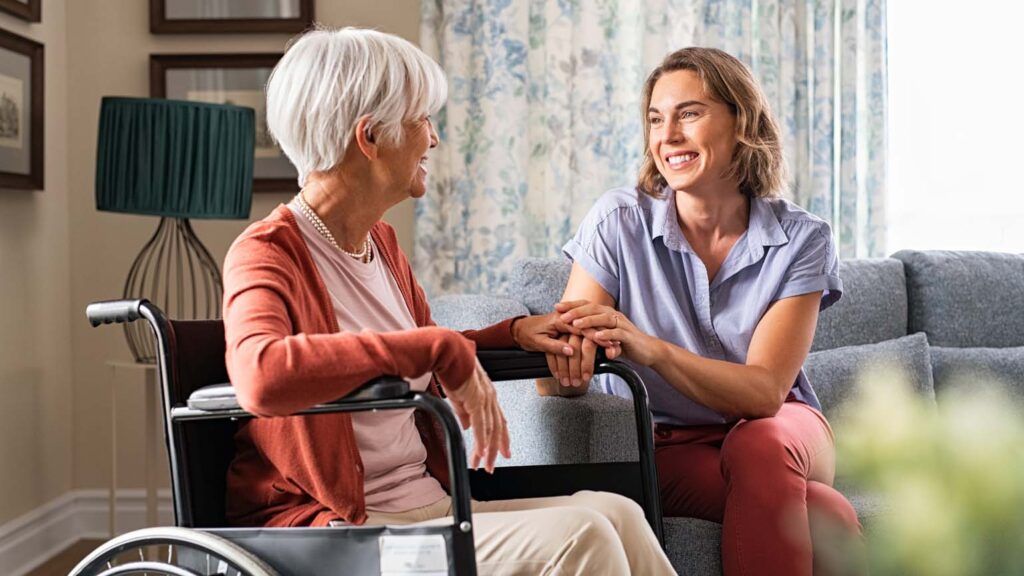It’s easy to see how the demands of caregiving can lead to a state known as hypervigilance. Merriam-Webster defines it as “extreme or excessive vigilance: the state of being highly or abnormally alert to potential danger or threat.” Simply put, all that you do to keep your loved one as physically and mentally healthy as possible requires your attention—and a great deal of it. That balance can get out of whack and you can neglect yourself.
“Hypervigilance is really a sense of always being on—not feeling that you have the opportunity to seek any respite, that you can’t turn off, you can’t turn inward, because your directional focus is continually outward,” said Erin C. Phipps, LCSW, owner of House of Joy in Denver. “So, I might say, ‘What do you do for yourself—what do you do for rest or what do you like to do?’ If as a caregiver, that’s very difficult to answer, it may be that you are in a pattern of hypervigilance due to the requirements of the individual that you care for.”
There’s no equation that causes a hypervigilant state, but various factors can contribute, including: how long you’ve been a caregiver, trauma, the particular challenges of a loved one’s chronic condition, difficult healthcare systems to navigate, your lifelong familial role and how naturally resilient you may or may not be. If you are in a hypervigilant state, what matters is finding your way back to yourself as you care for your loved one.
“The opposite of hypervigilance may be presence or calmness, awareness—all of these things that sort of open your scope a little bit so that your vigilance isn’t continually directed outward,” Phipps said. “You can have a more reciprocal exchange for your own needs, as well as those of the individual that you care for. Seeking opportunities to take care of yourself is very important.”
Phipps offered the following suggestions to help you strike a counterbalance if you feel that you’re a hypervigilant caregiver:
- Seek respite “Are there opportunities for someone from an agency or a support system to come in and give you an opportunity to get some rest, get some relief, take a trip, take a night or an afternoon or whatever you have the opportunity for? Can you take some scheduled, planned time where you know that you are going to be able to get some reprieve from this outwardly directed energy and be able to do things to take care of yourself as an individual? That’s a big deal. You might not be able to do that frequently, but seek opportunities to do that.”
- Create personal rituals “The most accessible and, I think, important coping strategy for anyone who is responsible for caring for another person is what I refer to as personal ritual. These aren’t things that we should be doing when we have time, when we think about it, when we’re already exhausted, when we’re already past the point of well-being and we’re already in a state of hypervigilance. Personal rituals are these things we do that we enjoy—little sensory experiences. A bath, your favorite tea, some really nice essential oil, a smell that you really like, a bedtime routine that you feel brings you peace, a wakeup routine that you feel brings you peace. These are rituals we can do throughout our day, every day for the most part, that we can build into our routine. They become these little opportunities that allow us to go inward every day.”
- Consider therapy if you feel you need it “If therapy works for you, if it’s one of your things that you like, that is a space for you to heal in the way that you need to. You might consider therapy to be one of your person rituals because it’s generally on a schedule, on the same day every week. But therapy’s not the thing for everybody. Therapy can help with a range of things, but it depends on the person.”
- Explore resources “As a caregiver, the systems that you’re up against are pretty taxing. Learning advocacy skills and knowing the rights of the individual that you caretake for helps you to feel empowered rather than always feeling like you’re behind the eight ball and it’s just you against the world. Becoming familiar, for instance, with whatever the local office of civil rights is in the area the person lives in is going to at least give you a sense of the reality that somebody has your back in this. There are also patient advocates in the various mental health and healthcare systems. Do a very quick Google search of whatever the diagnosis you’re working with is and ‘advocacy organization’ to see what’s available in your general area. The National Alliance on Mental Illness (NAMI) is another really, really great resource. There are resources out there, there are people who care, there are people who can help you advocate and there are other people who are going through what you are going through. You’re not alone.”






